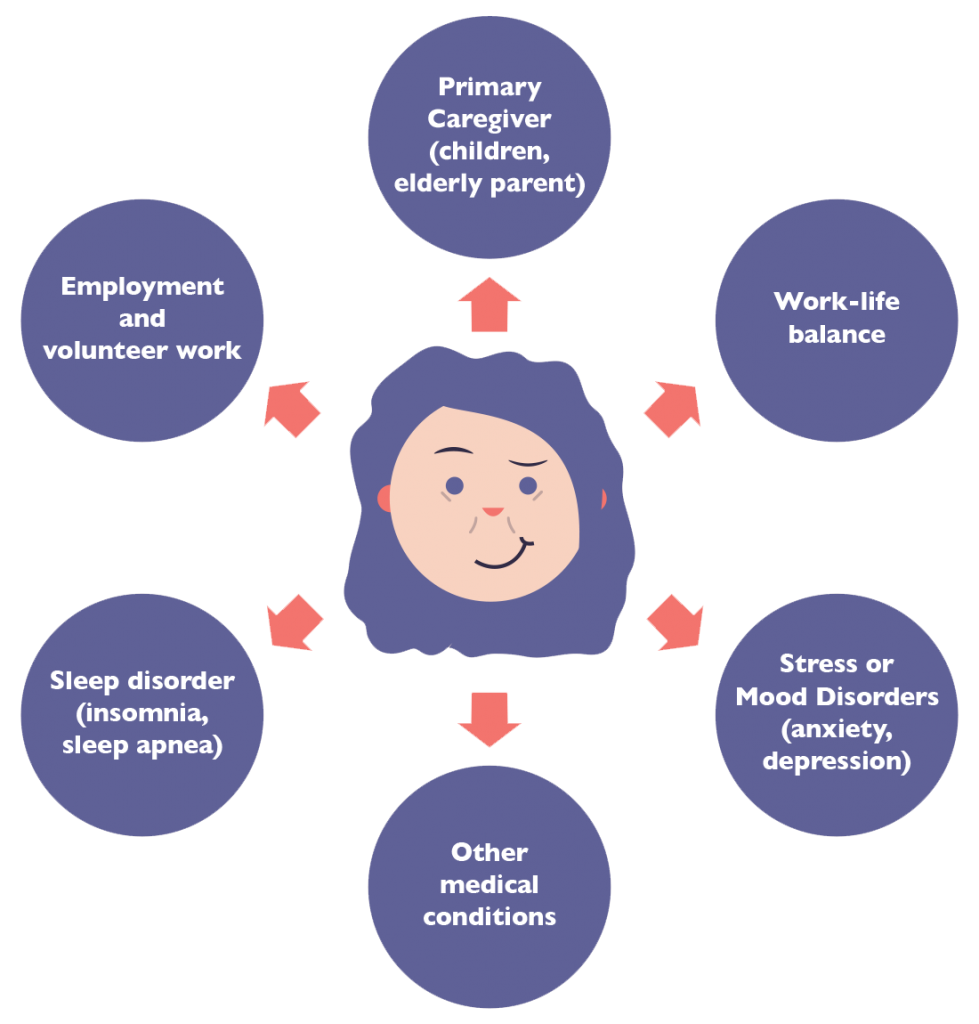How to Sleep During Menopause
To sleep better during menopause, maintain a consistent sleep schedule and create a relaxing bedtime routine. Menopause can disrupt sleep patterns, causing hot flashes and night sweats.
Establishing a regular sleep routine and creating a calm environment can help improve sleep quality.

Credit: www.mnsleep.net
Understanding Menopause And Sleep Challenges
Menopause is a natural biological process that marks the end of a woman's menstrual cycles. It typically occurs in the late 40s or early 50s, and is characterized by a decline in the production of estrogen and progesterone hormones. This hormonal shift can lead to a range of physical and emotional symptoms, including sleep disturbances.
During menopause, hormonal changes can disrupt the body's natural sleep-wake cycle, making it harder for women to fall asleep and stay asleep. Hot flashes, night sweats, and mood swings can also contribute to sleep disturbances. Additionally, menopause may increase the risk of developing sleep disorders such as insomnia and sleep apnea.
Common sleep challenges experienced during menopause include frequent waking during the night, difficulty falling back to sleep, and overall poor sleep quality. These sleep disturbances can lead to daytime fatigue, irritability, and problems with concentration and memory.

Credit: www.everydayhealth.com
Tips For Improving Sleep During Menopause
Create a sleep-friendly environment by making your bedroom comfortable, quiet, and dark. Ensure you have a supportive mattress and pillow that are conducive to a good night's sleep.
Establish a bedtime routine that includes winding down before bed. Avoid stimulating activities and electronics that can interfere with sleep. Instead, engage in relaxing activities such as reading a book or taking a warm bath.
To manage hot flashes and night sweats, keep your bedroom cool and use breathable, moisture-wicking bedding. Dress in light, breathable pajamas and consider using a fan or air conditioning.
Practice relaxation techniques such as deep breathing, meditation, or yoga. These can help reduce stress and promote better sleep.
Regular exercise is essential for overall health and can improve sleep quality. Engage in moderate-intensity exercises like walking, swimming, or cycling on a regular basis.
Consider talking to your doctor about hormone therapy or other treatments for menopausal symptoms that are affecting your sleep. They can provide guidance and recommend appropriate options based on your individual needs.
Other Lifestyle Changes To Support Sleep
Managing stress levels is crucial for improving sleep during menopause. Find healthy ways to cope with stress such as practicing relaxation techniques, engaging in regular exercise, and creating a calming bedtime routine.
Be mindful of your diet and avoid triggering foods that can disrupt sleep. Some common triggers include spicy or acidic foods, as well as heavy meals before bedtime. Stick to a balanced diet and ensure you're getting adequate nutrients.
Limiting caffeine and alcohol intake is essential for promoting restful sleep. Caffeine is a stimulant that can interfere with falling asleep, so it's advised to avoid it, especially close to bedtime. Alcohol, although it may initially make you feel drowsy, can disrupt sleep patterns and cause wakefulness later in the night.
Avoid excessive daytime napping, as it can make it harder to sleep at night. If you need to rest, opt for brief power naps of around 15-20 minutes earlier in the day.
If sleep problems persist and significantly affect your quality of life, seek professional help. Consulting a healthcare professional, such as a sleep specialist or your doctor, can provide further guidance and assistance tailored to your specific needs.
:max_bytes(150000):strip_icc()/insomnia-56d65ed25f9b582ad501ba10.jpg)
Credit: www.verywellhealth.com
Frequently Asked Questions On How To Sleep During Menopause
How Does Menopause Affect Sleep?
During menopause, hormonal changes can disrupt sleep patterns and lead to insomnia, hot flashes, and night sweats. The decrease in estrogen levels may also cause mood swings and anxiety, further hindering sleep quality.
What Are Some Tips For Sleeping Better During Menopause?
To sleep better during menopause, create a relaxing bedtime routine, avoid caffeine and alcohol close to bedtime, maintain a cool and comfortable sleep environment, exercise regularly, and consider using natural remedies or hormone therapy under medical supervision.
Can Hormone Therapy Improve Sleep During Menopause?
Hormone therapy can help improve sleep during menopause by replacing the declining hormones. Estrogen therapy may reduce hot flashes, night sweats, and other menopausal symptoms that disrupt sleep. However, it's important to consult with a healthcare provider to determine if hormone therapy is the right option for you.
Are There Natural Remedies To Help Sleep During Menopause?
Yes, there are natural remedies that can help improve sleep during menopause. These include practicing relaxation techniques like deep breathing or meditation, using herbal supplements like valerian root or black cohosh, maintaining a regular sleep schedule, and trying relaxation exercises before bed, such as gentle yoga or stretching.
Conclusion
Overall, improving sleep during menopause is crucial for maintaining both physical and mental well-being. By implementing the strategies discussed, such as establishing a bedtime routine, optimizing sleep environment, and incorporating relaxation techniques, women can experience better quality sleep and alleviate common menopausal symptoms like hot flashes and night sweats.
Remember, finding the right approach may require some trial and error, so be patient and persistent in your quest for a restful night's sleep. Sweet dreams await!
Comments
Post a Comment